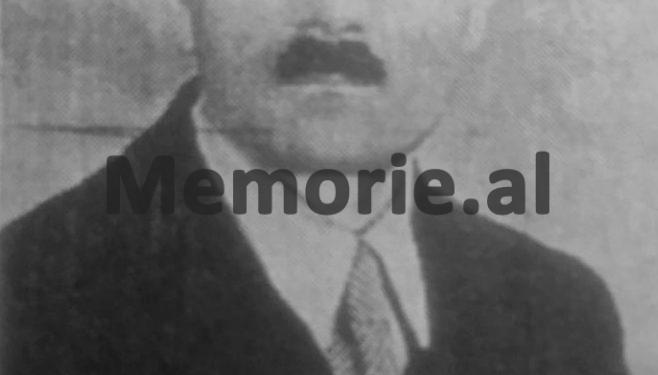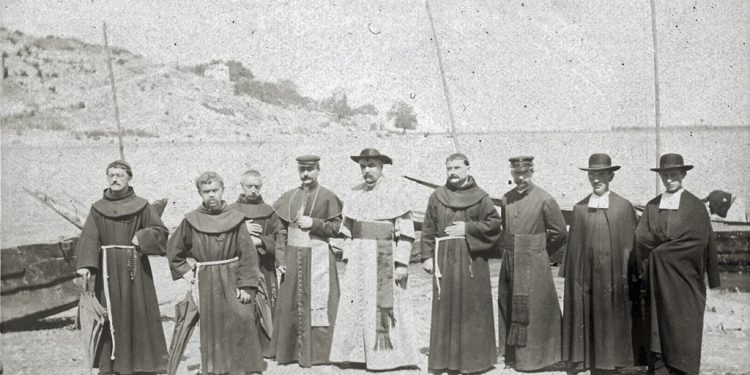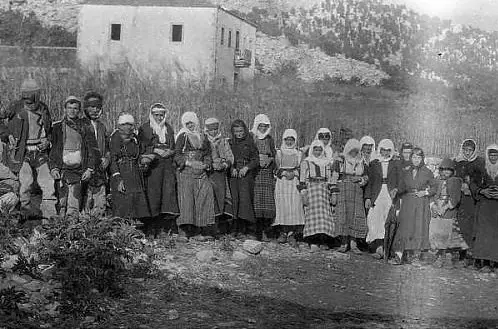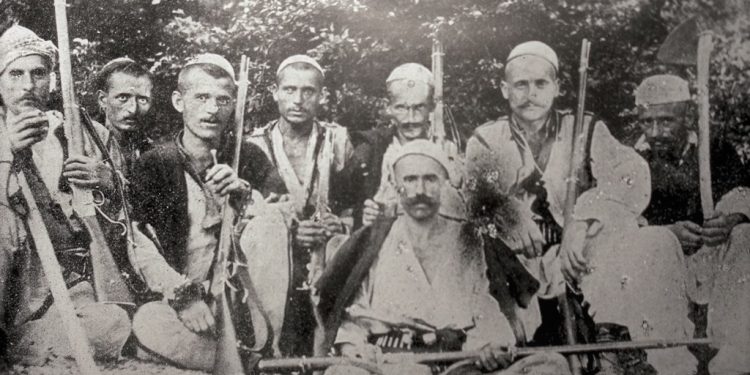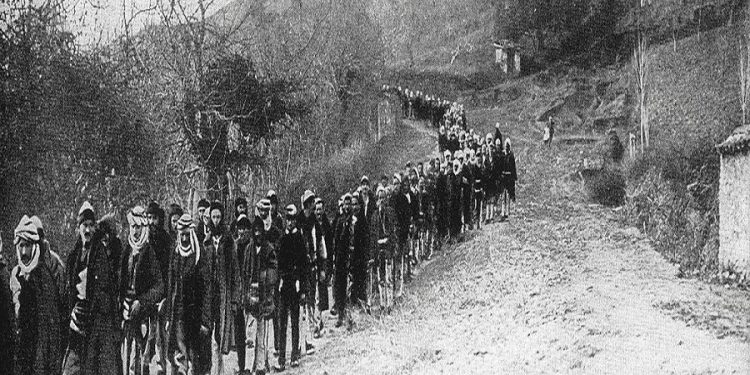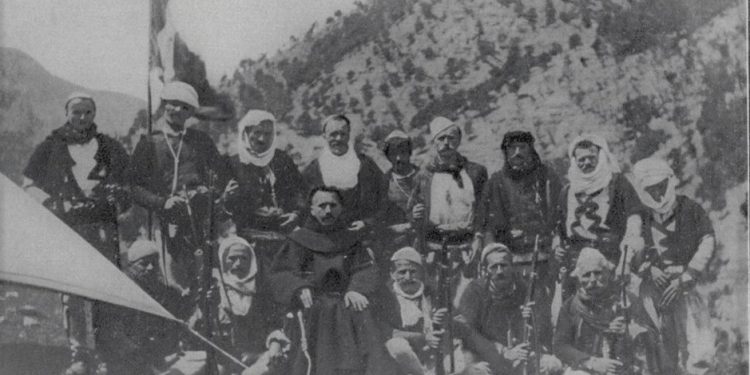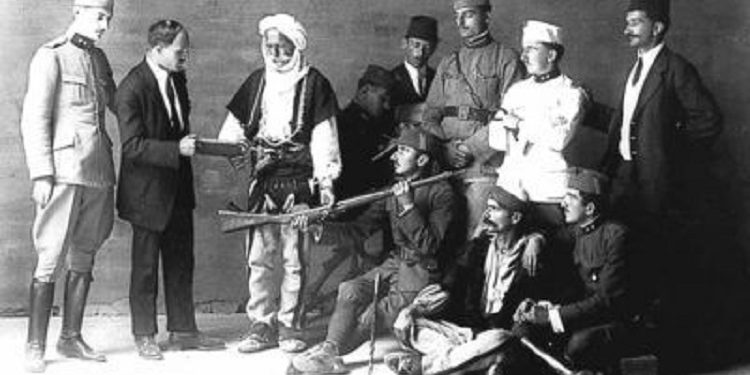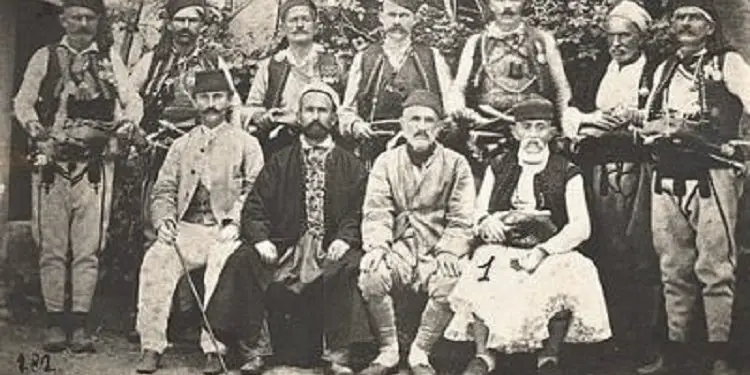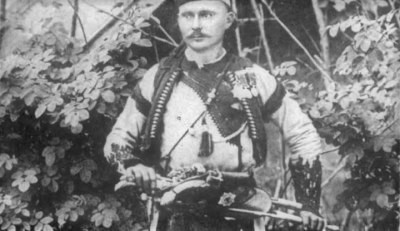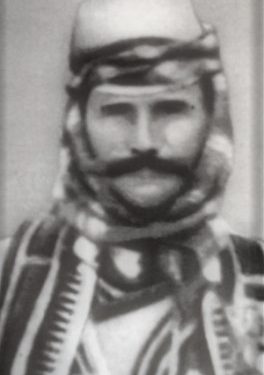By Caf Jonuz Culaj
Memorie.al/In the history of the northern provinces of Albania, are mentioned excellent tribes for generosity, bravery, and wisdom. Their leaders are also mentioned. One of them, without forgetting the others, is the Hoti tribe and its leaders. Today there are 16 generations of this leading door. Let t, we count from the beginning, Lazër, Gegë, Junc, Cekë, Gjon, Lucë, Mehmet, Mustafë, Haxhi, Mul, Çun, Met, Deli, Kastriot and Denis. Based on the calculations made by ethnologists, it turns out that this door is about 500 years old, i.e. 5 centuries old. Each of these leaders has its own story. For one of them, Çun Mula, who participated in the Albanian League of Prizren, the great poet Gjergj Fishta would write, “This Çun Mula is a strict house, when they eat bread the blind and the poor, in Hot first house, boy after bajraktar son “.
Muli, Delia’s eldest son, also known as Mul Bajraktari, was born in 1895. Hoti, his tradition and fame, were the first schools to prepare him for his first lessons. At a very young age, he attended a military school in Austria. After finishing them brilliantly, he returned with the rank of lieutenant. He served in the Border Armed Forces, all over Albania, he had the menu at his childhood Hoti, he had the menu at the unification of the Albanian lands, until then divided. He was for ethnic Albania. On April 7, 1939, fascist Italy invaded and occupied Albania. Mul Delia at that time battalion commander in Tirana, with the rank of lieutenant, joined Abaz Kupi, Ibrahim Mandiqi and others, who fought in Durrës for the protection of the coastal border. He fought as hard as he could until the last bullet. More could not do. Then he retired to private life, in his native village.
The fascist regime asked for his help, but he did not intervene. He was for a united Albania, in which freedom and equality were guaranteed by laws where order and peace would reign. For this purpose in 1942, he organized the Covenant in Malësia, whose task was to reconcile bloodshed and maintain peace. On August 30-31, 1943, numerous Italian forces attacked the village of Rec. The fascists had to face the nationalist armed forces, consisting of the people of Reç, the partisans of the “Perlat Rexhepi” battalion, the ballistas and legalists and the Albanian soldiers who had deserted from the Italian army a month ago. The war lasted two days and ended with the crushing of the fascists. Importantly, Mul Delia was asked by some traitors to join forces with the Italians, but he refused. First, he was anti-fascist, and second, he could not provoke a fratricidal war in the highlands. This gesture is still remembered today.
For the fascists, after this attitude, Mul Delia was in the spotlight. Even with the arrival of the Germans, he was again targeted. In the summer of 1944, he was arrested and interned in Mat’hausen, Austria. Eqerem Karma from Berat recalls: “Mul Bajraktar and I were sent to the camp at the same time. We stayed all the time with our friends. There we were considered dead. I had the number 136555, and Muli, 136556”. It is understood by readers what the Nazi extermination camps were. There you would die, as a result of forced labor, fatigue, illness, etc. Lucky were those who survived, including Muli. The allied forces that triumphed over Nazism made possible the liberation of these unfortunates from these camps. Most of them were repatriated to their countries of origin. The Albanians were stationed in Bari, where the Allied Headquarters of the Mediterranean was located.
There Muli met many Albanian nationalists who had managed to escape the communist siege. They told him about the situation in Albania at that time, telling him about trials, shootings, imprisonments, internments, etc. There he learned that the Albanian nationalists had no place. Under these circumstances, he continued the life of a political emigrant, first in Italy and then in Syria. The photo taken in this post was shot in Reggio Emilia on 12.7.1947. in which, he sends to his sister “In memory of my dear sister Rushe”. Below is “Memory of the days of exile”. In emigration he worked with the idea of overthrowing the dictatorial regime of Enver Hoxha. For this, he would work with other emigrants, believing that better days would come in Albania. At the height of his career he fell ill and died in Damascus, Syria. He was buried with due honors. The news of his death spread throughout.
In Montenegro, his cousin Smajl Haxhia took out the vigil and had a mortuary lunch in the presence of many Albanians from Hoti, Gruda, Plava, and Gucia. The news also entered Albania illegally. His sons and daughters, grandchildren, received consolation in secret. It was a time that today’s generation finds it very difficult to understand. You could even be prosecuted for this human gesture. Mul Delia, there was no hurricane left. It took the advent of democracy for his bones to come to Albania. His son, Leka, and cousin Delo Çun Mula reburied him in his hometown. The reburial of his bones was sensational. On both sides of the border, the men and women highlanders who attended the ceremony were not counted. There were many and no one could count them. There were also local government authorities. There, the order “For high patriotic services for the benefit of the homeland” was handed over to Mul Delia by the President of the Republic. /Memorie.al




